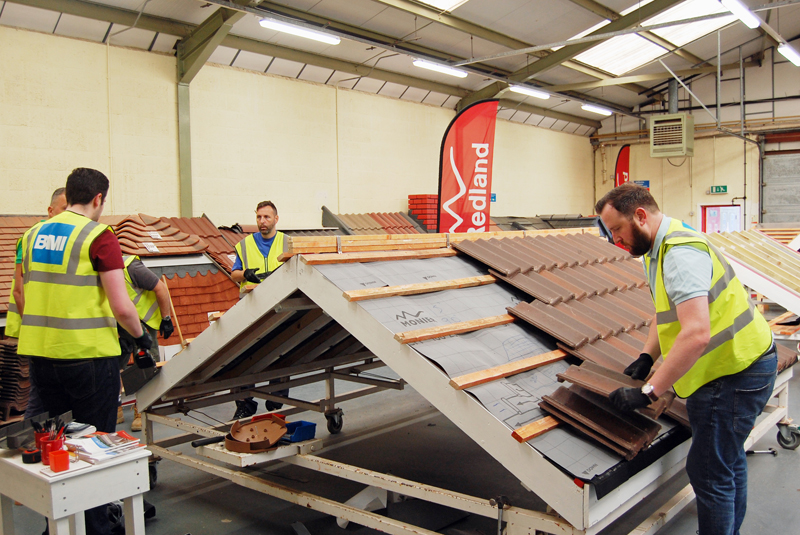
Demand for BMI’s pitched roofing training is said to be on the rise for all quarters of the industry. PBM signed up to a course at its National Training Centre to find out what merchants and their customers can expect to discover.
Situated in South Cerney near Cirencester and set up by Redland 35 years ago, the BMI National Training Centre provides both pitched and flat-roof training to a variety of customers and the group’s own staff. Traditionally, the mix of ‘external’ trainees has been around 30% roofers and 70% other customers, such as merchants, local authorities and housing associations. However, in the last few years that split has moved to 50:50, as more contractors recognise the value of upskilling their workforce.
Our session was led by Alastair Blant, Technical Trainer – Pitched, who explained that he had trained 47 roofing contractors the week before we attended a course at the centre. He said: “There is a changing attitude towards training in the roofing sector. Contractors want to be seen to be more professional and training is the main way, if not the only way, to upskill.”
BMI says it is the only pitched roofing manufacturer to provide the two-day CITB and NFRC recognised Basic Competency Programme in pitched roofing. This allows roofers to convert from a green labourer’s card to a Red experienced worker one, on the understanding that they will be working towards an NVQ over the next three years.
Alastair and his colleagues provide a range of roof training through the centre, with 1,500 people coming through the doors every year. They also train at other BMI sites and at customers’ sites, offices or merchants premises.
Our course was a two-day basic introduction to pitched roofing. However, with Icopal also being part of BMI Group, the centre gives basic and advanced training in a variety of flat roofing technologies too including bitumen, single ply and a variety of hot and cold applied liquid technologies.
Courses are designed to add extra value to the BMI customer relationship and equip decision-makers and influencers with information they need to confidently stock, sell, specify or install the supplier’s systems.
The two-day basic roofing course combines alternating classroom and workshop sessions. With an engaging delivery style, Alastair injects elements of history, geography, geology and an unending supply of roofing anecdotes into the more expected course content. Indeed, his snippets of history — all roofing relevant — included the march of the Roman Empire into Britain, the use of roof tiles as ballast on merchant boats and air pollution during the industrial revolution.
His stories from the field meanwhile, gleaned from BMI technical colleagues and course attendees, ranged from horror stories of badly-installed roofs and miscalculations to an explanation of why there we have Dutch pantiles on the east coast of England.
The 12 people on our course came from a range of backgrounds including counter staff from builders’ and roofing merchants, component suppliers to BMI, and sales and marketing people from within the group. Theoretical subjects included the basics of roofing terminology, through to recent updates in British Standards and a brief introduction to estimating for roofs.
One of the newest additions to the course materials is information on BS 8612 Dry-fixed Ridge, Hip, Verge and Valley Systems for Slating and Tiling, which was published earlier this year. As well as a classroom session covering the standard, attendees got the opportunity to install Redland’s new dry verge — which Alastair informed us was the first new verge which meets and exceeds the requirements of the new standard — in the workshop. Other practical activities included laying a concrete pantile roof and exercises with plain tiles and slate.
For many of the people attending the course, the workshop sessions were a real eye opener. Offering the merchant’s perspective, Andrew Perrett, an Assistant Manager for Gloucestershire-based Bence, said: “To get up and do the practical side of it has been really good. It’s given me more understanding of what goes into the process. It may seem like a simple process but there are lots of things that can easily go wrong.”
The updates on standards and the grounding in estimating were also particularly useful, according to Andrew. He explained: “People do come in and ask for advice, even those that have been doing it for years. I’ve got a better insight now.”
As the trainees left the centre, armed with the company’s guide to roofing The Redland Book and its pocket-sized range brochure, Alastair explained that his role was to ensure that roofs are installed with attention to detail and a proper understanding of the products and how they should be used. For that, he said, it is essential to reach out to both the contractors and the merchants who supply them: “We don’t teach people how to be roofers; we teach them how to be better roofers and how to be better sellers of roofing systems.”
Redland is part of BMI Group, a combination of Braas Monier and Icopal. Headquartered in Crawley, West Sussex, Redland operates six manufacturing and six distribution sites nationally plus a National Training Centre in Gloucestershire.









